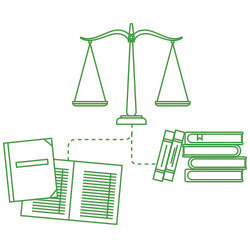When one of the parties to a Family Law proceeding is bankrupt, it is important for the lawyers involved to understand the assets that form part of the bankruptcy (i.e. the assets that vest in the Bankruptcy Trustee) and the assets that do not form part of the bankruptcy (i.e. exempt assets).
 A Bankruptcy Trustee (Trustee) is interested in a Family Law proceeding insofar as there are vested assets. If there are material vested assets, it is likely that the lawyer for the non-bankrupt spouse will need to liaise with both the Trustee and the bankrupt spouse (and/or their advisors). A Trustee may decide to become a party to the proceeding.
A Bankruptcy Trustee (Trustee) is interested in a Family Law proceeding insofar as there are vested assets. If there are material vested assets, it is likely that the lawyer for the non-bankrupt spouse will need to liaise with both the Trustee and the bankrupt spouse (and/or their advisors). A Trustee may decide to become a party to the proceeding.
What are the vesting provisions?
Section 58 of the Bankruptcy Act 1966 (Act) provides that all property owned by a bankrupt at the start of their bankruptcy and all property acquired by, or devolved on, the bankrupt during the term of their bankruptcy vests in the Trustee (unless the property is specifically exempt).
The Trustee has the power to take control of and realise all vested assets for the benefit of the bankrupt estate. Importantly, a bankrupt is no longer able to deal with assets that have vested in the Trustee.
What assets commonly vest in the Trustee?
Assets (property) vest in the Trustee unless the Act has specified that they are exempt. The most common examples of vested assets are:
- Real property
- Cash at bank at the date of bankruptcy (a bankrupt can generally retain a modest sum for living expenses)
- Digital currency
- Vehicles such as cars, motorbikes, trailers, caravans, boats (subject to exemptions)
- Tools of trade (subject to exemptions)
- Shares and other investments (including shares in privately held companies)
- Tax refunds that are in respect of income derived prior to bankruptcy
- Debts owed to the bankrupt (including debts owed by related parties)
- Inheritances (where the person died before or during bankruptcy)
- Lottery and other winnings during bankruptcy
What assets do not vest in the Trustee?
Exempt assets are outlined in Section 116(2) of the Act and include:
- Motor vehicles used by a bankrupt for transport, provided their value is below a prescribed limit (currently $8,100)
- Tools of trade used by a bankrupt to earn income, provided their value is below a prescribed limit (currently $3,800)
- Superannuation, provided that no contributions were made into the fund to defeat creditors
- Property held on trust for another person
- Household property that is reasonably necessary for domestic use
- Personal property of sentimental value of a kind outlined in Regulation 6.03A of the Bankruptcy Regulations 1996 (subject to approval from creditors)
- Life assurance policies of a bankrupt or their spouse or de facto partner
- Compensation for personal injury or wrongdoing to a bankrupt or their spouse, de facto partner or family member
 Key takeaway
Key takeaway
When it comes to Family Law proceedings and one of the parties is bankrupt, it is important for lawyers to identify the vested and non-vested assets of the parties’ asset pool to ensure that they are communicating with the correct party.
HOW CAN RSM HELP?
If you have any questions regarding Family Law and Bankruptcy contact your local RSM expert.
This page has been prepared by RSM Financial Services Australia Pty Ltd ABN 22 009 176 354, AFS Licence No. 238282.
As everyone's circumstances are different and this article doesn't take into account your personal situation, it is important that you consider the above in light of your financial situation, needs and objectives, and seek financial advice before implementing a strategy.
View the Financial Services Privacy Statement and Policy, Complaints Policy and Financial Services Guide

